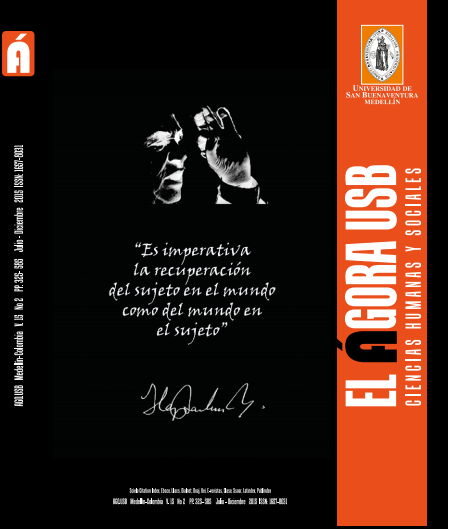View/Download
How to Cite
Tasso, P. (2015). On the memory, consciousness, and thought in latin america. between the lagoon and the swamp. Ágora USB, 15(2), 393–400. https://doi.org/10.21500/16578031.1621
More Citation Formats
License terms
▼
The authors are also adhere to the creative commons license 4.0 (https://creativecommons.org/licenses/by-nc-nd/4.0/deed.es)
Attribution - NonCommercial - SinDerivar 4.0 International (CC BY - NC - ND 4.0)
Abstract
Some routes of analyses around the following question: How to incorporate ethically the problem in their daily actions, and similarly, how to avoid the successful strategies of oblivion and indifference? are addressed in this paper. Certain emphasis is made on the gained importance that the popular processes have specially those related to the youth, while, thanks to their narratives, they increase and succeed, on a daily basis, over the authoritarian rhetoric seeking to silence memory
Keywords:
References
Angenot, M. (2010). El discurso social. Los límites históricos de lo pensable y lo decible. Buenos Aires: Siglo XXI.
Ankersmit, F. (2001). “The postmodernist privatization of de past”, en historical representation. Stanford: Stanford University Press.
Bernard, C., & Gruzinski, S. (1996). Historia del nuevo mundo, del descubrimiento a la conquista. La experiencia europea 1492-1550. México: Fondo de Cultura Económica.
Castells, M. (2009). Comunication power. New York: Oxford.
Chomsky, N., & Herman, E. (1988). Manufacturing consent: The political economy of mass media. New York: Pantheon Books.
Dussel, E. (1994). El encubrimiento del indio:1492. (Hacía el origen de la modernidad). México: Editorial Cambio XXI.
Halbawchs, M. (1992). On collective memory. Chicago: The University Chicago Press.
Hijos de México. (14 de Octubre de 2014). Obtenido de hijosdemexico.org: www.hijosmexico.org/index-ayotzinapa
Nora, P. (1984). Entre mémorie et histoire. La problematique des lieux”, en Lex Lieux de mémorie. Paris: Gallimard.
Palti, E. (2003). La nación como problema Los historiadores y la “Cuestión nacional”. Buenos Aires: Fondo de Cultura Económica.
Pappe, S. (2007). “Memoria versus historia”. En M. Aguiluz Ibarguen, & G. Waldman M,Memorias )in)cógnitas. Contiendas en la historia. México:UNAM.
Ramonet, I. (1986). La tiranía de la comunicación. Buenos Aires: Ramonet.
Richard, N. (2007). Fracturas de la memoria. Arte y pensamiento crítico. Buenos Aires: Siglo XXI.
Ricoeur, P. (1999). La lectura del tiempo pasado: memoria y olvido. París: Arrecife Producciones.
Ricoeur, P. (2003). La memoria, la historia, el olvido. Madrid: Editorial Trotta.
Tasso, P. (2014). “La historiografía oficial de 1968” Tesis de doctorado en historiografía. México: Universidad Autónoma de México.
Wrigth Mills, C. (1964). “Acciones situadas y vocabularios de motivos”, en Poder, política, pueblo. México: Fondo de Cultura Económica.
Zemelman, H. (2000). “ En torno de la memoria y el futuro”. Contextos: Contextos: Revista de humanidades y ciencias sociales, 131-140.
Ankersmit, F. (2001). “The postmodernist privatization of de past”, en historical representation. Stanford: Stanford University Press.
Bernard, C., & Gruzinski, S. (1996). Historia del nuevo mundo, del descubrimiento a la conquista. La experiencia europea 1492-1550. México: Fondo de Cultura Económica.
Castells, M. (2009). Comunication power. New York: Oxford.
Chomsky, N., & Herman, E. (1988). Manufacturing consent: The political economy of mass media. New York: Pantheon Books.
Dussel, E. (1994). El encubrimiento del indio:1492. (Hacía el origen de la modernidad). México: Editorial Cambio XXI.
Halbawchs, M. (1992). On collective memory. Chicago: The University Chicago Press.
Hijos de México. (14 de Octubre de 2014). Obtenido de hijosdemexico.org: www.hijosmexico.org/index-ayotzinapa
Nora, P. (1984). Entre mémorie et histoire. La problematique des lieux”, en Lex Lieux de mémorie. Paris: Gallimard.
Palti, E. (2003). La nación como problema Los historiadores y la “Cuestión nacional”. Buenos Aires: Fondo de Cultura Económica.
Pappe, S. (2007). “Memoria versus historia”. En M. Aguiluz Ibarguen, & G. Waldman M,Memorias )in)cógnitas. Contiendas en la historia. México:UNAM.
Ramonet, I. (1986). La tiranía de la comunicación. Buenos Aires: Ramonet.
Richard, N. (2007). Fracturas de la memoria. Arte y pensamiento crítico. Buenos Aires: Siglo XXI.
Ricoeur, P. (1999). La lectura del tiempo pasado: memoria y olvido. París: Arrecife Producciones.
Ricoeur, P. (2003). La memoria, la historia, el olvido. Madrid: Editorial Trotta.
Tasso, P. (2014). “La historiografía oficial de 1968” Tesis de doctorado en historiografía. México: Universidad Autónoma de México.
Wrigth Mills, C. (1964). “Acciones situadas y vocabularios de motivos”, en Poder, política, pueblo. México: Fondo de Cultura Económica.
Zemelman, H. (2000). “ En torno de la memoria y el futuro”. Contextos: Contextos: Revista de humanidades y ciencias sociales, 131-140.
Downloads
Download data is not yet available.




















